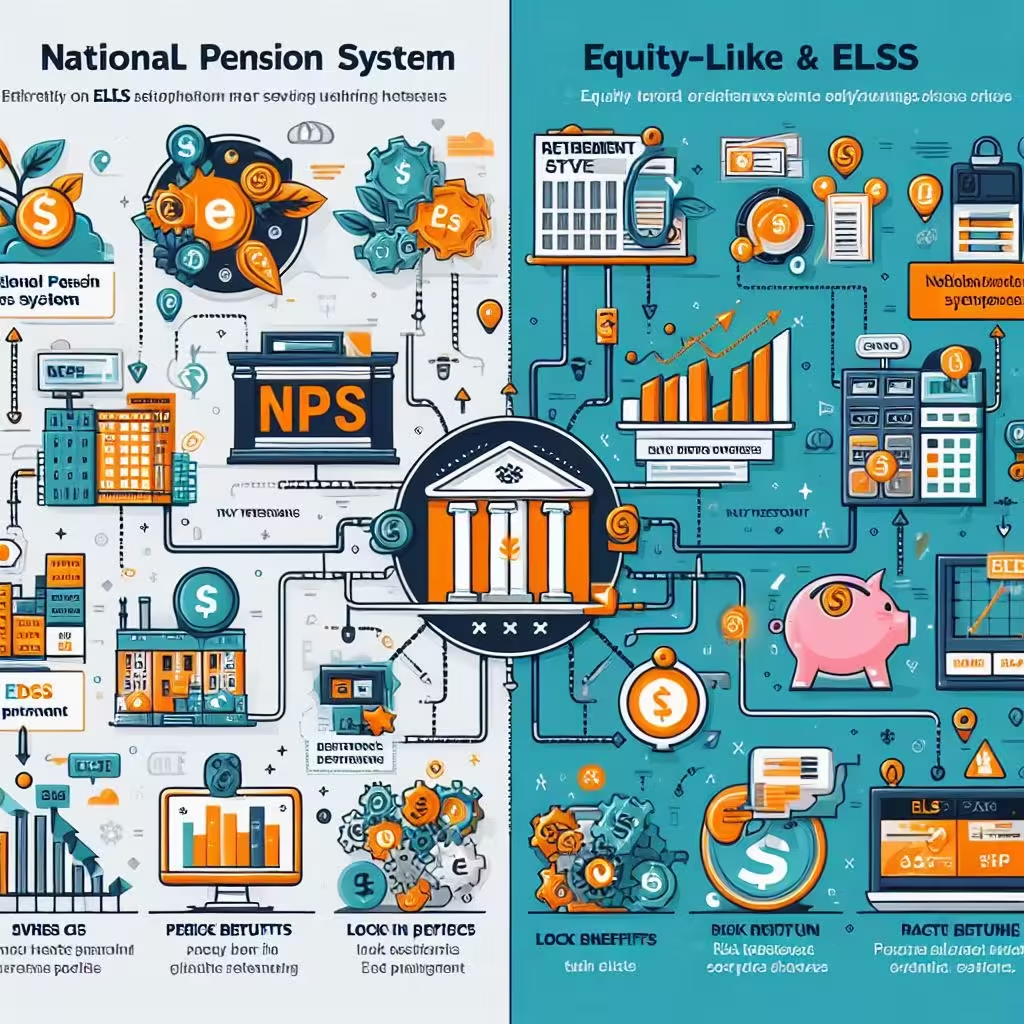In the ever-evolving landscape of Indian tax planning, choosing the right investment avenue can be a daunting task. Two popular options frequently emerge: National Pension System (NPS) and Equity Linked Savings Scheme (ELSS). Both offer tax benefits under Section 80C, but cater to distinct financial goals and risk appetites. This blog post delves into the intricacies of NPS and ELSS, empowering you to make an informed decision aligned with your individual needs.
Understanding NPS:
- What is NPS?
- NPS is a government-sponsored pension scheme designed to provide individuals with a regular income source after retirement.
- It offers tax deductions under Section 80C for contributions up to Rs. 1.5 lakh annually, with an additional deduction of Rs. 50,000 under Section 80CCD (1B).
- Investment Strategy:
- NPS invests your contributions in a mix of equity, corporate debt, and government bonds, with the asset allocation changing as you age.
- The investment choices are limited compared to ELSS, with minimal control over asset allocation.
- Lock-in Period:
- NPS has a strict lock-in period until the age of 60, with limited withdrawal options before retirement.
- This feature makes it suitable for long-term wealth creation and retirement planning.
- Returns:
- NPS returns are market-linked and depend on the chosen investment option and overall market performance.
- Historically, NPS returns have been moderate compared to other equity-based investments.
Understanding ELSS:
- What is ELSS?
- ELSS is a type of mutual fund that invests primarily in equities.
- It offers tax deductions under Section 80C for investments up to Rs. 1.5 lakh annually.
- Investment Strategy:
- ELSS funds offer a diverse range of investment options across various market segments and risk profiles.
- You have greater control over your investment choices and can actively manage your portfolio based on your risk tolerance.
- Lock-in Period:
- ELSS has a relatively shorter lock-in period of 3 years from the date of investment.
- This provides greater flexibility compared to NPS and allows for potential portfolio adjustments based on market conditions.
- Returns:
- ELSS returns are primarily driven by equity market performance and can be potentially higher than NPS returns over the long term.
- However, ELSS also carries inherent market risks associated with equity investments.
Choosing the Right Option:
The ideal choice between NPS and ELSS depends on several factors:
- Investment Horizon:
- If you have a long-term investment horizon exceeding 10 years and prioritize retirement planning, NPS could be suitable due to its disciplined approach and guaranteed income post-retirement.
- If you have a shorter investment horizon or seek more flexibility, ELSS might be a better fit due to its shorter lock-in period and potential for higher returns.
- Risk Tolerance:
- If you have a low risk tolerance and prefer guaranteed returns, NPS might be your preferred choice due to its focus on debt and government bonds.
- If you have a higher risk tolerance and are comfortable with market fluctuations, ELSS could offer the potential for higher returns over the long term.
- Financial Goals:
- If your primary goal is retirement planning and securing a regular income source post-retirement, NPS aligns well with this objective.
- If your goal is wealth creation or achieving specific financial goals within a defined timeframe, ELSS might be a more suitable option.
Conclusion:
Both NPS and ELSS offer valuable tax benefits and cater to distinct financial needs. Carefully evaluate your investment horizon, risk tolerance, and financial goals to determine which option aligns best with your unique circumstances. Consulting a qualified financial advisor can provide personalized guidance and help you make an informed decision for your tax-saving journey.
Remember: Diversification is key to a well-balanced portfolio. Consider incorporating both NPS and ELSS into your investment strategy based on your specific needs and risk profile to leverage their unique benefits and optimize your long-term financial well-being.
Please note:
- GrowWise is not registered with the Securities and Exchange Board of India (SEBI) as an investment advisor, research analyst, or portfolio manager.
- The information published on this blog is presented for educational purposes only and should not be construed as financial advice.
- We strongly recommend that you seek the advice of a qualified financial advisor before making any investment decisions.



Leave a Reply